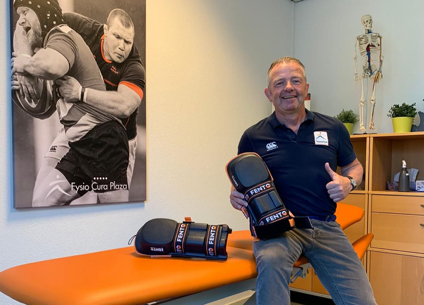PREVENTION IS BETTER THAN CURE

Antoine van den Berg is a physiotherapist and manual therapist at FysioCuraPlaza. He has been in the business for 32 years and has wide experience of treating back and knee complaints. When asked to tell us more about his experience, he stressed that prevention is the all-important factor. “Physiotherapy can help treat a host of complaints but prevention is absolutely vital”, Antoine explains.
STRAIN AND WEAR AND TEAR
“Back and knee complaints are often caused by strain”, Antoine says. Professions I often see at the practice include tilers, floor layers, paviours, plumbers and screeders. They spend much of their working time kneeling or crouching, often on an uneven surface, which puts tremendous strain on their back and knees.”
Strained knees are the underlying cause of various conditions. A common condition is bursitis, or fluid in the knee, an inflammation of the fluid between the skin and the kneecap beneath it. “The bursa usually acts as a buffer in parts of our body where there is a great deal of pressure or friction”, explains Antoine. “Imagine it as a little sac filled with fluid. If this sac becomes inflamed, it swells and becomes very painful. The surrounding skin is also often inflamed, going red and feeling hot. This complaint is also known as housemaid’s knee, as it is common in people who spend a lot of their time kneeling. This upsets the balance between the load on and the capacity of the surrounding tissue. Arthritis, or wear and tear, is another common cause of knee complaints.”
PREVENTION IS BETTER THAN CURE
Physiotherapy can resolve some conditions but wear and tear is something that cannot really be repaired. “Prevention is better than cure and that is why I advise people who work on their knees to invest in good knee protectors”, Antoine says. “You want your back and knees to last longer than your working life, don’t you? And who would not like to age without complaints, remaining mobile, active and able to play with their children and grandchildren?
DEVELOPED ON THE BASIS OF PRACTICAL EXPERIENCE
“I wanted to recommend the best knee protectors to my clients, to prevent further complaints, which brought me to FENTO. I heard the history of the FENTO knee protector and was immediately sold on them. Physiotherapist Geert Kaal and his client René van Rijn developed the knee protectors based on practical experience. René was a sailmaker and no longer able to work on his knees. He had already tried and tested several kinds of knee protectors, but nothing helped. He asked his physiotherapist to help him develop a knee protector that would enable him to continue working. And that he did. The development involved a lot of research, and he cast plaster moulds for dozens of people to determine the best ergonomic shape. These then served to create several prototypes, which were subsequently tested by various ‘kneelers’ such as tilers, parquet floor layers and builders. These tests revealed the need for a knee protector which not only distributed the pressure across the knee but also along the lower leg. Local strains are the cause of many complaints, after all. They really do work fantastically well. Thanks to FENTO, I have been able to help many of my clients prevent further complaints.”
————-
About Antoine van den Berg, Msc.
Born and raised in Soesterberg, Antoine moved to Utrecht at the age of 19 to study Physiotherapy. Following an intensive time as a student, he graduated in 1988. As one of the last conscripts, and after deputising in various other posts, he joined Aardenburg Military Rehabilitation Centre in Doorn. Taking this experience with him, he later moved to Groot Klimmendaal Rehabilitation Centre in Arnhem. He worked in both the upper extremities team and the back team and this sparked his interest in manual therapy and hand rehabilitation. Now, in 2020, he runs the FysioCuraPlaza, together with two partners, with six branches in Haarlemmermeer and Amsterdam. He combines work and hobby as a physiotherapist for the Dutch rugby team. Another passion besides rugby is golf.





